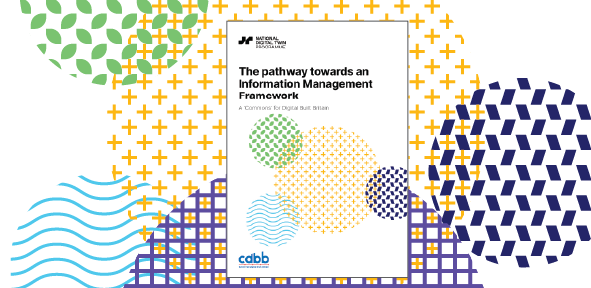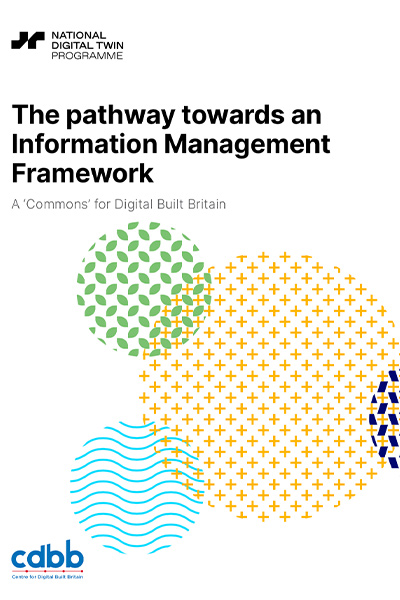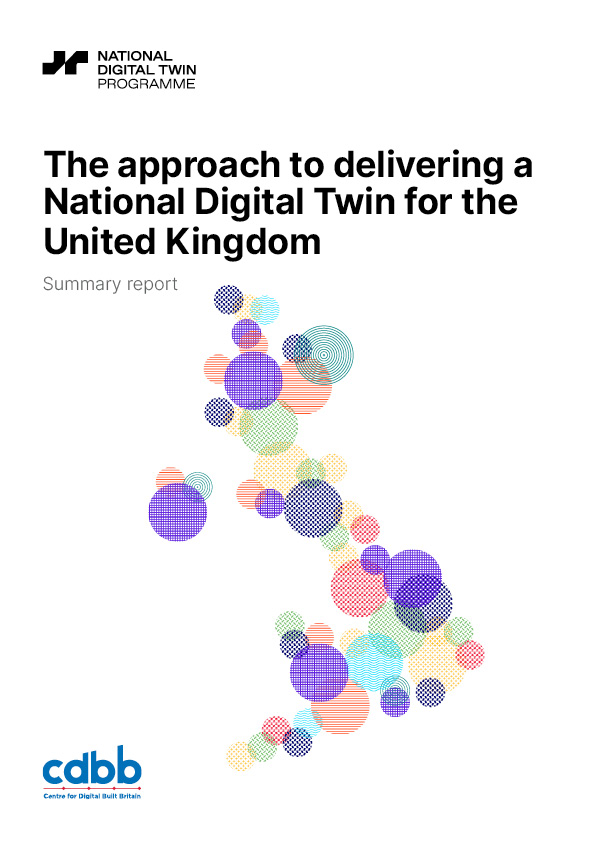
Submitted by Angela Walters on Wed, 20/05/2020 - 11:42
The Centre for Digital Built Britain’s National Digital Twin programme has launched an open consultation seeking feedback on the proposed approach to the development of an Information Management Framework for the built environment.
A new report, The Pathway Towards an Information Management Framework: A Commons for a Digital Built Britain, sets out the technical approach for the development of an Information Management Framework (IMF) to enable secure, resilient data sharing across the built environment. The publication of the report by CDBB, in partnership with the Construction Innovation Hub, is a critical milestone towards a National Digital Twin.
It follows a year-long consultation exercise, led by CDBB as a partner in the Construction Innovation Hub, bringing together leading experts from the data science and information management communities to collectively tackle the challenge of improving data sharing across the built environment sectors.
On the publication, Mark Enzer, Head of the National Digital Twin Programme said, “I would really like to thank everyone who has come together over the past 18 months to help develop this proposed pathway towards an Information Management Framework. It represents a huge amount of work and exemplifies the collaborative approach that will be needed as we seek to enable an ecosystem of connected digital twins – the National Digital Twin.
“The challenge is sizeable, but the promise is huge: better outcomes coming from better decisions based on better connected data. And, working with industry, academia and Government all pulling together we can deliver it. So, I’d urge you to join with us on this journey and help us build consensus on the way forward.”
The way that digital twins are connected is important to ensuring security and the improving the resilience of assets and systems. The goal of the IMF is to establish a common language by which digital twins of the built and natural environment can communicate securely and effectively to support improved decision taking by those operating, maintaining and using built assets and the services they provide to society. Its development by CDBB was recommended by the National Infrastructure Commission in 2017’s Data for the Public Good report and HM Government’s Construction Sector Deal.
The consultation questions are:
- It has been proposed that the Information Management Framework (IMF) should essentially consist of a Foundation Data Model (FDM), a Reference Data Library (RDL) and an Integration Architecture (IA). Do you agree with this overall framework? In your view, are there any key elements missing from this framework?
- In your view, is the proposed approach to the IMF consistent with the Gemini Principles? Are there any inconsistencies that should be addressed?
- Section 3.4 lists the models and protocols that would form part of the IMF. Is there anything that you would like to suggest to improve this list?
- Section 3.5 describes key concepts of a Foundation Data Model. Is there anything that you would like to suggest to improve this description?
- Section 3.6 describes key concepts of the Reference Data Library. Is there anything that you would like to suggest to improve this description?
- Section 3.7 describes key concepts of an Integration Architecture. Is there anything that you would like to suggest to improve this description?
- Section 4 proposes a pathway for developing the IMF. Do you agree with the proposed overall approach? In your view, are there any key tasks missing from this pathway? Would you suggest any improvements to the order in which the tasks are undertaken to develop the IMF?
- What do you see as the barriers to connecting digital twins within organisations and between different organisations/sectors? How can these barriers be overcome?
- In your experience what are the reasons why organisations invest in the creation of digital twins? Why would they invest in connecting digital twins?
- Do you have any other comments on the proposed approach to developing the information management framework?
- What opportunities do you see arising in your business from being able to connect Digital Twins and share and integrate data across them?
The consultation on the IMF is open until 31 August and responses can be submitted here.
The National Digital Twin Programme is run by the Centre for Digital Built Britain, a partnership between the University of Cambridge and Department for Business, Energy and Industrial Strategy. The programme’s mission is to securely guide industry towards building a smarter nation that improves lives and creates a more sustainable planet for the public good. The programme’s objectives are to deliver the Information Management Framework, to enable the National Digital Twin and to align industry, academia and Government on this agenda.
Supported by government, we are uniting the collective knowledge and diverse voices of experts to set the framework that will empower others to advance change and embrace connected digital twins within their own organisations. The NDT programme runs the Digital Twin Hub, a collaborative web-enabled community for those who own, or who are developing digital twins within the built environment.
The Centre for Digital Built Britain, is a partner in the Construction Innovation Hub, funded by UK Research and Innovation through the Industrial Strategy Challenge Fund. The Construction Innovation Hub brings together world-class expertise from the Manufacturing Technology Centre (MTC), BRE and the Centre for Digital Built Britain (CDBB) to transform the UK construction industry.
In addition to this report, we have also published 'The approach to delivering a National Digital Twin for the United Kingdom', which outlines the National Digital Twin Programme’s progress to date, while looking ahead to the development of the Information Management Framework.
Download 'The pathway towards an Information Management Framework - A ‘Commons’ for Digital Built Britain':
Download 'The Approach to Delivering a National Digital Twin for the United Kingdom - Summary report:
Submit Consultaton Response:
Webinar:
A Webinar on the National Digital Twin programme's open consultation on 'The Pathway Towards an Information Management Framework' was held on 8 June 2020. You can view the full webinar below:
The questions raised during the webinar are available here. The full transcript of the webinar is available here.


